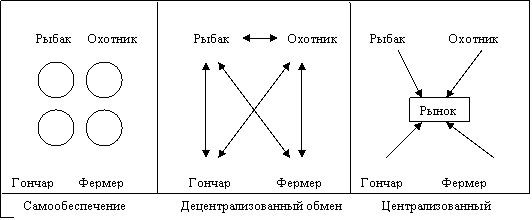home
 Marketing Marketing
 Principles of Marketing - Philip Kotler Principles of Marketing - Philip Kotler
|
Principles of Marketing - Philip Kotler
Market
The term "transaction"? directly brings us to the concept of "market".
The market? set of existing and potential purchasers of the goods.
To understand the nature of the market, imagine a primitive economic community of four people: a fisherman, a hunter, a potter and a farmer. Fig. 3 shows three different ways to meet these people their needs. The first method? self, when each of them can independently get everything you need for yourself. For the fisherman, spending most of the time for fishing, and the rest of the hunt, and the Potters, and is engaged in agriculture, to provide themselves with everything that he needs. While the effectiveness of its activities in fishing is reduced as well as the effectiveness of training

Fig. 3. The formation of a centralized exchange
its main business of others. The second way - decentralized exchange, when one considers the other three as their potential "buyers" that make up its market. Fisherman can visit Hunter, a potter and a farmer (individually) to exchange their fish for their goods. The third way - a centralized exchange, in which appears on the scene a new face, referred to as a merchant and located somewhere in the middle between them, in a place under the code name "Market Square". Each of the four specific products their unlucky merchant, and there exchange them for all that they need. Thus, for the purchase of goods offered by others, the fisherman has to do with a "market" rather than with three separate entities. The emergence of the merchant sharply reduces the total number of transactions necessary to carry out the exchange in any given volume. In other words, the merchant and the central market of trade and increase operational efficiency economy.4. (For more on trading and operational efficiency described in Ch. 12.)
As the number of persons and transactions is growing and the number of merchants and markets. In a developed society, the market - this is not necessarily any physical place to meet and carry out transactions, buyers and sellers. With modern means of communication and transport in the evening the merchant can provide the goods on television advertising, collect hundreds of orders from clients on the phone and the next day send the goods by mail, without coming into physical contact with customers.
Can form the market for any goods, services or other object having a value meaning. For example, the labor market is made up of people who want to offer their labor in exchange for wages or goods. To facilitate the functioning of the labor market around it arise and multiply various institutions such as offices and consulting firms on employment. Money Market? Another important market that meets human needs, which allows you to borrow, lend, save money, and ensure their safety. Formed and donators market designed to meet the financial needs of non-profit organizations so that they can continue their activities.


Comments
Commenting, keep in mind that the content and the tone of your messages can hurt the feelings of real people, show respect and tolerance to his interlocutors, even if you do not share their opinion, your behavior in terms of freedom of speech and anonymity offered by the Internet, is changing not only virtual, but real world. All comments are hidden from the index, spam control.